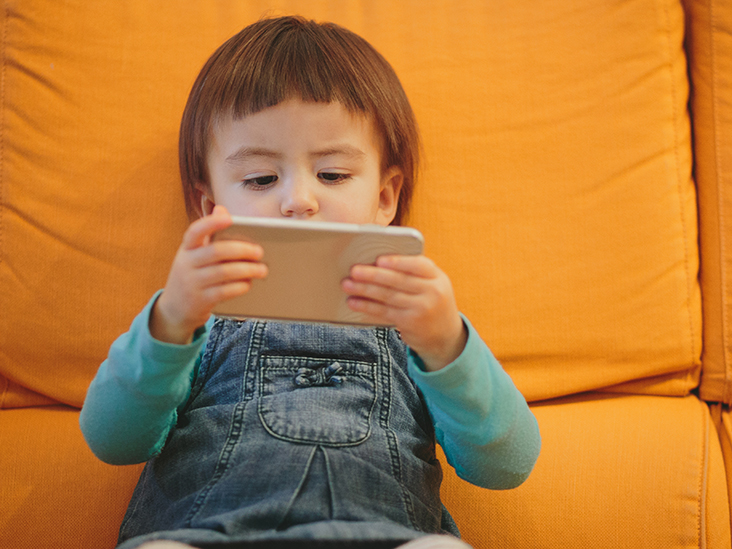

Cell Phone Effects on Child Development

Caption: The increased screen time may result in damaging future outcomes
Source: Psych Central
Over the past years, cell phones have become an integral part of our daily lives. From a toddler to the elderly, everyone consumes content from their cell phones or other digital devices. However, this increased exposure to screen time has made room for several mental and physical ailments.
Due to early exposure children face adverse effects of mobile usage. According to Common Sense Media, only 11 percent of children aged 8, owned mobile phones in 2015 which increased to 19 percent in 2019. More than 80 percent of children aged between 14 to 18 years owned mobile phones in 2020 which is projected to have increased further now.
As much as it is concerning, some parents do not hesitate to give their children a personal cell phone while others wonder what might be the ideal age for using a phone. But how does exposure to cell phones affect child development and how much screen time should a child have? We try to answer at these questions here. By the end, you’ll get a better understanding of how exposure to cell phones affects children.
Mobile Effects on Child

Caption: Mobile usage results in a range of physical, mental, and behavioral effects
Source: Panda Security
Using cell phones can give rise to many issues among children. Depending on the duration of screen time, several mental, physical, and even behavioural issues can be noticed in children. Let us take a look at the effect of cell phone usage on your child.
1. Mental Effects
Using cell phones from an early age can give rise to several cognitive issues, including shorter attention spans and changes in thinking patterns. The radio waves emitted from cellphones affect children more than adults. Using cell phones from an early age may also result in violent behaviours.
Studies reveal that children who spend too much time on cell phones, show a premature thinning in the brain’s outermost layer. This layer, called the cortex helps in processing different sensory information. The thinning of the cortex usually takes place during the later years of growth. Thus, the usage of cell phones may cause children to mature at an unnatural rate.
2. Physical Effects
Cell phone radiation may get a toll on your child’s physical health. Using cell phones from an early age may result in visual and hearing impairments. Myopia is a common result of screen exposure. Sitting in a place for hours, looking at the mobile screen, may result in bad posture and related diseases.
Exposure to cell phones from an early age can even cause cancer. Studies have shown that younger children are more vulnerable. Cell phone radiations are carcinogenic and children absorb these radiations 60 percent more than adults. The children may also develop non-malignant tumors in their ears and brains.
3. Exposure
While using cell phones, children might come across many inappropriate contents on the internet. These may result in certain behaviour changes during the development period of a child. Parents might not always be aware of what their kids are watching on cell phones or how many hours they spend doing so. The children may come across the following content which is inappropriate for their tender age :
- Risk-taking and violent activities
- Content that is sexual
- Harmful stereotypes
- Use of substances
- Predators and cyberbullies
- Inaccurate or misleading information
Spending Too Much Time on Phone Effects:
Too much exposure to cell phones from childhood results in chronic issues.
1. A Lack of Sleep
Because of the blue light from cell phones, the creation of melatonin gets hampered, and thus the hours your child spends on-screen influence the quantity and quality of their sleep. Some parents let their children stay engaged on the phone before bedtime. This causes difficulty in sleeping.
2. Obesity Risk is Higher
Since the use of a cell phone is sedentary, children are deprived of physical activities. This leads to gaining weight, particularly if they have a habit of eating while using cell phones. Children often get enticed to eat more unhealthy foods by the countless fast-food advertisements that they come across while on the internet.
3. Developing Chronic Medical Conditions
As excessive usage of cell phones increases the chances of obesity, it naturally puts people at a higher risk of developing chronic diseases. These diseases may include type 2 Diabetes, Cancer, and even heart diseases. Long periods of sitting in a place while using cell phones produce an increase in insulin levels and fat buildup in the bloodstream.
4. Cognitive Deterioration
One of the most concerning effects of cell phone usage is seen on the cognitive abilities of children. Long screen time changes the structure of the brain, especially in the growth stage. This leads the grey matter of the brain to shrink. The grey matter regulates cognitive functions. Cell phone exposure also deforms the white matter in the brain, which acts as the signal transmission network. Shorter attention span, memory loss, and poor impulse control are all results of excessive cell phone usage.
5. Poor Socializing
Most of the time, social media chats are not much related to real-life interactions. Spending hours on cell phones is a lonely and unproductive pass time for children. The lack of real interactions may result in some antisocial behaviours and may end up making your child feel lonely. Longer hours on a cell phone cause impaired socialising skills which impact children in the longer run.
5. Poor Socializing
Most of the time, social media chats are not much related to real-life interactions. Spending hours on cell phones is a lonely and unproductive pass time for children. The lack of real interactions may result in some antisocial behaviours and may end up making your child feel lonely. Longer hours on a cell phone cause impaired socialising skills which impact children in the longer run.
6. Early Childhood Delay in Learning
Changes in the structure of the brain caused by prolonged use of cell phones influence children’s learning ability. Children who use more cell phones have a harder time mastering languages. This gap in learning can be as high as 50 percent in most children. Allowing children to consume educational materials on a cell phone is not the ideal approach to teaching them. Children learn best by physical exploration.
7. Self Esteem Issues
Spending longer hours on a cell phone may distort the self-image of children. The standards set by social media are largely fake and prolonged exposure to social media may cause children to have a lower sense of self-worth. Teenagers who follow beauty standards on social media may get critical of their bodies.
Realise Importance Of Good Habit For Your Kids

Caption: In this digital era, parents should strictly restrict screen time according to the age-wise recommendations
Source: The Learning Agency Lab
It is recommended for parents to restrict screen time for children until more data on the impact of cell phones on a child’s health is revealed. According to the American Academy of Pediatrics (AAP), the screen time recommendation by age is as follows:
- Children aged 18 months or younger should not have any screen time at all. At such an early age the cognitive growth of a child may be severely impaired by exposure to cell phones.
- Children aged 18 to 24 months should only watch high-quality educational content with their parents. They should not be allowed to view anything on their own.
- Children aged 2 to 5 years can watch educational programmes. Parents should make sure their children are not exposed to violent or inappropriate content. The amount of time spent in front of the screen should not exceed one hour on weekdays and three hours on weekends.
- Children aged 6 years or above should be more productive and spend lesser time on cell phones. Parents should make sure that their child goes out to socialise and does not develop a cell phone addiction.
Most Popular
Subscribe To Our Weekly Newsletter
Related Posts

What to Do if Your Kid is Afraid to Go to School?
Source: https://www.risingkashmir.com/userfiles/image/ Your child is normally enthusiastic about school, but when it comes time to go, they become adamantly opposed. Perhaps you can get them

Disciplined And Routine Lifestyle For Children Explained!
The Subtle Art of Discipling Kids Source: Beenke With the influx of technology in all sphere of life, the children of today are born in

Solutions to the Most Common Challenges in the Indian Education System
Education in India: History, Problems & Solutions Source: https://images.csmonitor.com/csmarchives/2010/04/0406-OLEARN-india-education.jpg?alias=standard_900x600 The Indian education system has its own set of concerns and challenges that must be addressed


